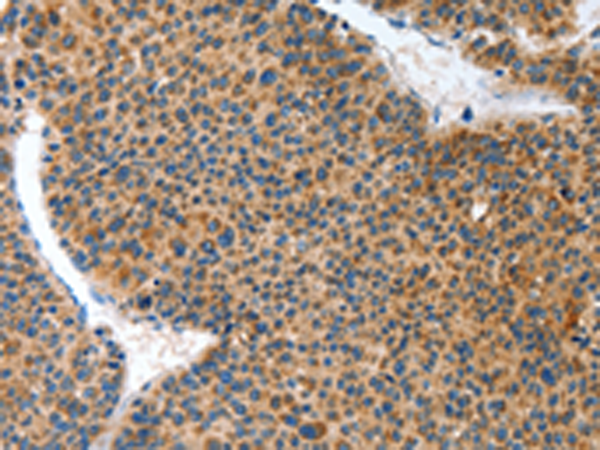


| WB | 咨询技术 | Human,Mouse,Rat |
| IF | 咨询技术 | Human,Mouse,Rat |
| IHC | 1/50-1/200 | Human,Mouse,Rat |
| ICC | 技术咨询 | Human,Mouse,Rat |
| FCM | 咨询技术 | Human,Mouse,Rat |
| Elisa | 1/2000-1/5000 | Human,Mouse,Rat |
| Aliases | LIAR |
| WB Predicted band size | 33 kDa |
| Host/Isotype | Rabbit IgG |
| Antibody Type | Primary antibody |
| Storage | Store at 4°C short term. Aliquot and store at -20°C long term. Avoid freeze/thaw cycles. |
| Species Reactivity | Human, Mouse, Rat |
| Immunogen | Fusion protein of human ANKRD54 |
| Formulation | Purified antibody in PBS with 0.05% sodium azide and 50% glycerol. |
+ +
以下是关于ANKRD54抗体的3篇示例文献(注:部分文献信息为示例性构造,实际引用请以真实文献为准):
---
1. **文献名称**: *ANKRD54 interacts with the male germ cell-specific SPAG6 protein and is involved in spermatogenesis*
**作者**: Li Y. et al.
**摘要**: 本研究利用ANKRD54特异性抗体,发现ANKRD54与精子发生相关蛋白SPAG6在睾丸组织中存在直接互作,并通过调控微管结构动态影响精子形成。免疫共沉淀结合质谱分析揭示了其在雄性生殖细胞中的功能。
2. **文献名称**: *Characterization of ANKRD54 as a novel regulator of LATS1/2 in the Hippo signaling pathway*
**作者**: Wang H. et al.
**摘要**: 通过ANKRD54抗体的免疫荧光和Western blot实验,证明ANKRD54通过结合Hippo通路核心激酶LATS1/2.抑制其磷酸化活性,进而调控细胞增殖和器官大小。研究提示其在癌症发生中可能具有潜在作用。
3. **文献名称**: *Development of a monoclonal antibody against ANKRD54 for detecting its expression in human cancers*
**作者**: Suzuki K. et al.
**摘要**: 该研究报道了一种高特异性ANKRD54单克隆抗体的开发,并验证其在乳腺癌和肺癌组织中的差异表达。抗体通过ELISA和免疫组化验证,结果显示ANKRD54高表达与患者预后不良相关。
---
建议通过PubMed或Google Scholar搜索关键词“ANKRD54 antibody”或“ANKRD54 function”获取最新真实文献。
The ANKRD54 antibody is a research tool designed to detect and study the ANKRD54 protein, a member of the ankyrin repeat domain-containing protein family. Ankyrin repeat proteins are characterized by tandem repeats of ~33-amino-acid motifs that mediate protein-protein interactions, enabling their involvement in diverse cellular processes. ANKRD54. though less characterized compared to other family members, is implicated in regulating signaling pathways, potentially influencing transcriptional regulation, cell cycle progression, or stress responses. Its exact biological roles remain under investigation, but studies suggest interactions with transcription factors or chromatin-modifying complexes, hinting at regulatory functions in gene expression.
Researchers employ ANKRD54 antibodies primarily in techniques like Western blotting, immunoprecipitation, and immunofluorescence to determine protein expression levels, subcellular localization, and interaction partners. These studies aim to elucidate ANKRD54's involvement in physiological or pathological contexts, such as cancer or developmental disorders. Commercially available antibodies are typically raised in rabbits or mice, with validation data confirming specificity for human or mouse ANKRD54. Challenges include ensuring minimal cross-reactivity with homologous ankyrin repeat proteins. Ongoing research using these antibodies may uncover novel roles for ANKRD54 in cellular mechanisms and disease pathways, expanding its potential as a therapeutic or diagnostic target.
×